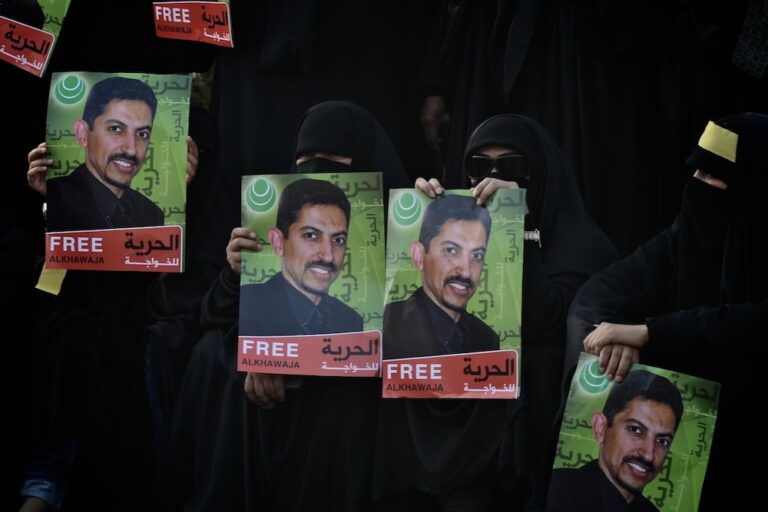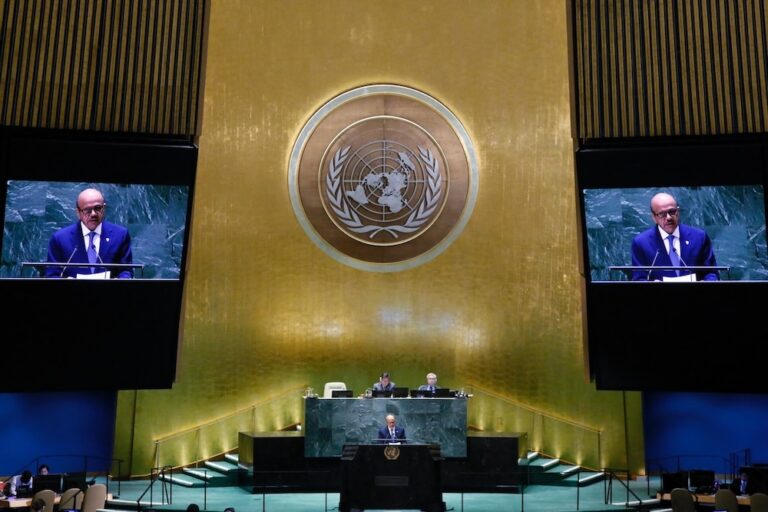Four people have been charged with "inciting hatred against the regime" after they held up photos of detained activists.
(BCHR/IFEX) – BCHR expresses concern about the continued targeting of public freedoms by the authorities, especially the limiting of freedom of opinion and expression and the criminalization of cases by attempting to brand them as security crimes or link them to terrorism.
BCHR has learned that four young men are on trial for carrying a banner in the capital, Manama, with pictures of detainees who are also political activists and human rights defenders. The authorities claim that carrying such a banner is an act of inciting hatred against the regime. This incident brings the number of people on trial in cases related to freedom of expression to 19 in the last three months.
In September, Hassan Abdullah Al-Qassim, 20, and Ahmed Ali Yousef, 20, were arrested. At the same time, the authorities tried to arrest two other young men, the brothers Ahmed Radhi amd Hasan Radhi, for hanging a banner with pictures of other detainees back in August. The two brothers have been charged with “publicly inciting hatred against the ruling regime”. Their trial, which began in October, has been adjourned until 5 December.
It should be noted that the first defendant, Hassan Abdulla, has previously been convicted in another case related to freedom of expression, in which he was also charged with “inciting hatred against the regime” after he distributed leaflets which revealed violations committed by the authorities and the torture of citizens; on 27 October he was sentenced to one year imprisonment. This trial is one of five cases currently before the court and is part of a series of trials targeting freedom of opinion and expression that began three months ago.
Eleven activists are among the defendants accused of being part of the so-called “organized network” and are charged with “inciting hatred against the regime” and “distribution of false information and possession of publications containing rumours”. Among these defendants is the activist and blogger Ali Abdulemam, who is also the founder of Bahrain Online, the popular site that has been publishing news of arrests and the ongoing human rights violations in the country since the start of the recent crackdown on rights activists in the run-up to October parliamentary elections, and which the authorities have been trying to block by all means possible.
Mohammed Mshaime’ and Hussain Aldurazi are on trial for “propagating negative images to foreign news agencies and channels”. They were charged after a BBC (Arabic) broadcast showed footage of riot police attacking civilians during a peaceful gathering.
In another case, Fakhriya Al-Singaice faces the same charge of “inciting hatred against the regime” after she was arrested for one day last August for holding up a banner in a shopping mall with the words to Article 9 of the Universal Declaration of Human Rights printed on it.
According to the penal code, the defendants in these cases could face up to two years’ imprisonment. However, sentencing them under the terrorism act, which has been condemned by international organizations, could raise that sentence to life in prison.
BCHR believes that referring cases related to freedom of expression to the special tribunals, which were formed a few weeks before the security crackdown, reveals the existence of legal loopholes which allow for the criminalization of citizens’ basic rights. This also reveals a sharp decline in freedoms in a country where even the possession or hanging of pictures of detainees can be considered a crime against the regime. These trials are a grave violation of international charters and covenants related to human rights, specifically Article 19 of the Universal Declaration of Human Rights and the International Covenant on Civil and Political Rights.
Based on all this, BCHR calls on the Bahraini authorities to:
– Immediately release all prisoners and detainees who are on trial in cases related to freedom of opinion and expression;
– Immediately stop using the terrorism law, which is internationally condemned for its lack of guarantees for a fair trial;
– End all measures that restrict freedom of opinion and expression or prevent the transmission of information;
– Stop the special tribunals which were formed to look into cases of a political nature, and return the jurisdiction power to the normal judiciary.


